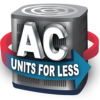What is a Commercial HVAC System?
A commercial HVAC system is designed to heat, ventilate, and cool large commercial spaces such as office buildings, retail stores, schools, and industrial facilities. These systems are much more complex and powerful than residential units due to the size and scale of the spaces they serve. They often combine heating, ventilation, and air conditioning components into one unified system, ensuring the comfort and air quality of multiple rooms or even entire floors in a building.
In commercial buildings, it’s essential to maintain stable indoor temperatures and air quality for the comfort of employees, customers, or tenants. A well-functioning HVAC system can improve productivity, protect sensitive equipment, and even extend the lifespan of a building.
Is There a Difference Between Residential and Commercial HVAC?
Yes, there are significant differences between residential and commercial HVAC systems. Residential units are typically smaller and serve individual homes, while commercial systems are designed for much larger spaces. Here are a few key differences:
- Size and Capacity: Commercial systems are much larger and built to handle higher cooling and heating demands.
- Complexity: Commercial systems often involve zoning, allowing different areas of a building to be heated or cooled independently. Residential systems typically only manage one or two zones.
- Location: In homes, HVAC units are usually installed outdoors or in a basement. Commercial systems, on the other hand, are often placed on rooftops to save indoor space.
- Maintenance: Commercial systems require more frequent and specialized maintenance to handle the heavy load they manage daily.
Is Commercial HVAC Hard on the Body?
For commercial HVAC technicians, the job can be physically demanding. Installing, repairing, and maintaining large commercial HVAC systems often involves lifting heavy equipment, working in cramped or awkward spaces, and being exposed to outdoor weather conditions, particularly when working on rooftop units. The work also requires climbing ladders, crawling through ducts, and working in potentially hot or cold environments. However, with the right training, tools, and safety measures, these physical challenges can be managed effectively.
What is a Commercial HVAC Technician?
A commercial HVAC technician specializes in the installation, repair, and maintenance of commercial heating, ventilation, and air conditioning systems. These professionals are trained to work on large-scale systems that are much more complex than those found in homes. Their responsibilities include:
- Installing commercial HVAC units
- Diagnosing and repairing issues with the system
- Performing regular maintenance to ensure efficiency
- Upgrading and retrofitting systems for better performance
Commercial HVAC technicians require advanced training and certifications to handle the complexity of large commercial systems.
Commercial HVAC Maintenance
Regular maintenance of commercial HVAC systems is crucial for ensuring that the system operates efficiently and reliably. Neglecting maintenance can lead to system breakdowns, increased energy costs, and expensive repairs. Here are key aspects of commercial HVAC maintenance:
- Regular Inspections: A technician should inspect the system regularly to check for wear and tear, leaks, and other issues.
- Filter Changes: Dirty filters reduce airflow and cause the system to work harder, leading to higher energy consumption.
- Cleaning Coils: The evaporator and condenser coils should be cleaned to ensure proper heat exchange and system efficiency.
- Checking Refrigerant Levels: Low refrigerant can cause the system to overheat and damage other components.
- Thermostat Calibration: Ensure that the thermostat is properly calibrated to maintain accurate temperature control.
By keeping up with maintenance, businesses can avoid unexpected downtime and extend the lifespan of their HVAC system.
Commercial HVAC System Cost
The cost of a commercial HVAC system can vary widely based on factors such as the size of the building, the type of system required, and the complexity of the installation. On average, businesses can expect to pay anywhere from $5,000 to $30,000 or more for a new commercial HVAC system, depending on their specific needs. Additional costs to consider include:
- Installation fees
- Ductwork modifications
- Thermostats and controls
- Zoning systems
- Energy-efficient upgrades
While the upfront cost can be significant, investing in an energy-efficient system can result in long-term savings through reduced energy bills.
Commercial HVAC System Types
There are several types of commercial HVAC systems, each designed to meet the specific needs of different types of buildings:
-
Single-Split Systems: Commonly used in smaller commercial buildings, single-split systems offer both heating and cooling. They are relatively affordable and easy to install, making them a popular choice for small businesses.
-
Multi-Split Systems: Similar to single-split systems, but allow for multiple indoor units to connect to a single outdoor unit. These systems offer zoning capabilities and are more energy-efficient, making them ideal for larger spaces.
-
Variable Refrigerant Flow (VRF) Systems: VRF systems are highly efficient and can heat and cool different areas of a building simultaneously. They are often used in medium to large commercial spaces due to their flexibility and energy savings.
-
Packaged Systems: These systems house the compressor, condenser, and evaporator in a single unit, usually placed on the roof. Packaged systems are space-saving and ideal for businesses with limited indoor space.
Choosing the right system depends on factors like the size of the building, energy efficiency goals, and budget.
Conclusion
Understanding the different aspects of commercial HVAC systems—from the types of systems available to maintenance requirements—can help businesses make informed decisions when upgrading or installing new HVAC units. Whether you need a cost-effective packaged unit or a sophisticated VRF system, keeping your commercial space comfortable year-round starts with selecting the right HVAC solution. For bulk pricing and expert guidance on commercial HVAC systems, visit Acunitsforless.com.


